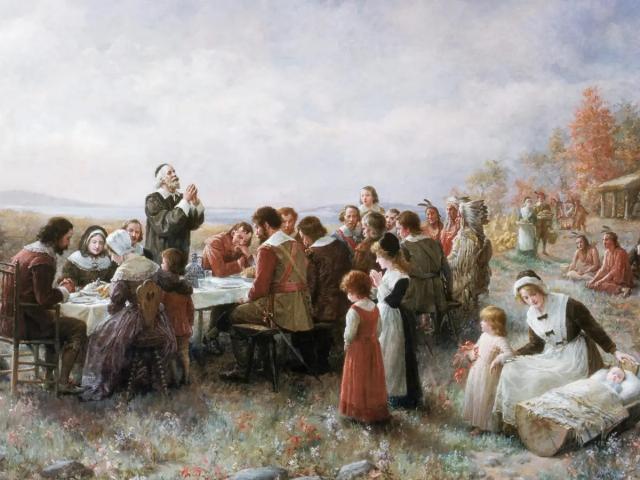by Paul Dowling, American Thinker:

The Plymouth Colony began as a collectivist commune, the idea being that everyone should participate according to the best of one’s ability, but that everybody should receive an equal reward. This meant working harder would not bring higher compensation, and working less would incur no penalty. The food shortage created by this scarcity-causing communalism was severe enough to cause people to starve to death, especially given the fact that an epidemic also was raging during the colonists’ first winter. Of the 100 Pilgrims who had come on the Mayflower, only about half that number survived to attend the first Thanksgiving: twenty-two men, four married women, and twenty-seven children. Thus, a large part of the first Thanksgiving was simply gratitude for having survived.
TRUTH LIVES on at https://sgtreport.tv/
It would be the leadership of William Bradford, whose common sense and inspirational guidance would deliver the Pilgrims from the ills of socialism to a healthy culture of economic freedom based upon individual property rights. Governor Bradford planted the seeds of freedom and justice for all that would bear fruit not only in his own lifetime, but into the future as well.
By fall of 1621, the Pilgrims were counting their blessings. After the harvest, Massasoit, the Wampanoag chieftain, and ninety of his tribesmen joined the Pilgrims in a harvest festival of thanksgiving for “several days, dining on venison, goose, duck, turkey, fish, and… cornbread, the result of a bountiful corn harvest.” The Pilgrims had entered into a defensive military alliance with the Wampanoag, and an Indian warrior named Squanto had taught them farming methods that worked in the soil of Plymouth. There was much to be thankful for.
During this first Thanksgiving, gratitude towards Governor Bradford would have been running high for his leadership, but there would be trouble in paradise in the not-too-distant future, as the initial excitement of working communally would soon wear off. The reason for this was that “the Plymouth colony bore many resemblances to a socialist society… [E]verything was owned by every colonist jointly. No one was allowed to own private land…” In other words, “the industrious… were forced to subsidize the slackers… in 1621 and 1622.”
The problem this eventually created for the Pilgrims had long ago been described by Aristotle, who had defended “the institution of private property, arguing that it encourages responsible stewardship and provides incentives for individuals to work hard and contribute to society.” And indeed, greater abundance did result once the Pilgrims abandoned socialism and privatized the Plymouth economy.
Not long after Bradford had distributed private property to each family, he noticed dramatic differences in the colonists’ behaviors:
[I]t made all hands very industrious, so as much more corn was planted than otherwise would have been by any means the Governor or any other could use, and saved him a great deal of trouble, and gave far better content. The women now went willingly into the field, and took their little ones with them to set corn; which before would allege weakness and inability; whom to have compelled would have been thought great tyranny and oppression.
In order to justify property rights biblically, the Pilgrims turned to the teachings of the Reverend John Cotton who invoked the Genesis story of Abraham. When  Abraham had been stopped from using a well he had dug, he “appealed to the Philistine king, Abimelech, claiming that he had the right to draw water because he was the person who had sunk the well… Abraham also made a specific claim of individual ownership, based on ‘his owne industry and culture in digging the well.” This meant there was biblical proof of the individual right to own land as property that depended on one’s efforts, and not upon the grant of some arbitrary privilege.
Abraham had been stopped from using a well he had dug, he “appealed to the Philistine king, Abimelech, claiming that he had the right to draw water because he was the person who had sunk the well… Abraham also made a specific claim of individual ownership, based on ‘his owne industry and culture in digging the well.” This meant there was biblical proof of the individual right to own land as property that depended on one’s efforts, and not upon the grant of some arbitrary privilege.
The new private economy became self-regulating, since those who were the heads of the landowning families became motivated to urge an industrious work ethic. Contrary to communalism, the fruits of private labor benefited the laborers directly, so the incentive to work harder came about naturally, without any need of external coercion or control. According to Tom Bethell of the Hoover Institute, this “division of property established a proportion or ‘ratio’ between act and consequence. Human action is deprived of rationality without it, and work will decline sharply as a result.”
Read More @ AmericanThinker.com



